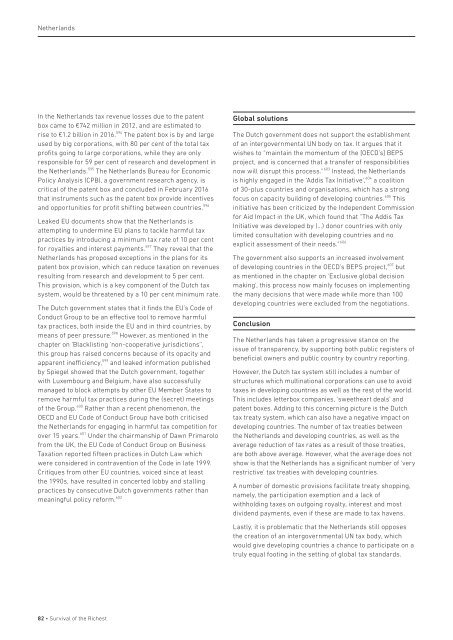You also want an ePaper? Increase the reach of your titles
YUMPU automatically turns print PDFs into web optimized ePapers that Google loves.
Ne<strong>the</strong>rlands<br />
In <strong>the</strong> Ne<strong>the</strong>rlands tax revenue losses due to <strong>the</strong> patent<br />
box came to €742 million in 2012, and are estimated to<br />
rise to €1.2 billion in 2016. 594 The patent box is by and large<br />
used by big corporations, with 80 per cent <strong>of</strong> <strong>the</strong> total tax<br />
pr<strong>of</strong>its going to large corporations, while <strong>the</strong>y are only<br />
responsible for 59 per cent <strong>of</strong> research and development in<br />
<strong>the</strong> Ne<strong>the</strong>rlands. 595 The Ne<strong>the</strong>rlands Bureau for Economic<br />
Policy Analysis (CPB), a government research agency, is<br />
critical <strong>of</strong> <strong>the</strong> patent box and concluded in February 2016<br />
that instruments such as <strong>the</strong> patent box provide incentives<br />
and opportunities for pr<strong>of</strong>it shifting between countries. 596<br />
Leaked EU documents show that <strong>the</strong> Ne<strong>the</strong>rlands is<br />
attempting to undermine EU plans to tackle harmful tax<br />
practices by introducing a minimum tax rate <strong>of</strong> 10 per cent<br />
for royalties and interest payments. 597 They reveal that <strong>the</strong><br />
Ne<strong>the</strong>rlands has proposed exceptions in <strong>the</strong> plans for its<br />
patent box provision, which can reduce taxation on revenues<br />
resulting from research and development to 5 per cent.<br />
This provision, which is a key component <strong>of</strong> <strong>the</strong> Dutch tax<br />
system, would be threatened by a 10 per cent minimum rate.<br />
The Dutch government states that it finds <strong>the</strong> EU’s Code <strong>of</strong><br />
Conduct Group to be an effective tool to remove harmful<br />
tax practices, both inside <strong>the</strong> EU and in third countries, by<br />
means <strong>of</strong> peer pressure. 598 However, as mentioned in <strong>the</strong><br />
chapter on 'Blacklisting 'non-cooperative jurisdictions'',<br />
this group has raised concerns because <strong>of</strong> its opacity and<br />
apparent inefficiency, 599 and leaked information published<br />
by Spiegel showed that <strong>the</strong> Dutch government, toge<strong>the</strong>r<br />
with Luxembourg and Belgium, have also successfully<br />
managed to block attempts by o<strong>the</strong>r EU Member States to<br />
remove harmful tax practices during <strong>the</strong> (secret) meetings<br />
<strong>of</strong> <strong>the</strong> Group. 600 Ra<strong>the</strong>r than a recent phenomenon, <strong>the</strong><br />
OECD and EU Code <strong>of</strong> Conduct Group have both criticised<br />
<strong>the</strong> Ne<strong>the</strong>rlands for engaging in harmful tax competition for<br />
over 15 years. 601 Under <strong>the</strong> chairmanship <strong>of</strong> Dawn Primarolo<br />
from <strong>the</strong> UK, <strong>the</strong> EU Code <strong>of</strong> Conduct Group on Business<br />
Taxation reported fifteen practices in Dutch Law which<br />
were considered in contravention <strong>of</strong> <strong>the</strong> Code in late 1999.<br />
Critiques from o<strong>the</strong>r EU countries, voiced since at least<br />
<strong>the</strong> 1990s, have resulted in concerted lobby and stalling<br />
practices by consecutive Dutch governments ra<strong>the</strong>r than<br />
meaningful policy reform. 602<br />
Global solutions<br />
The Dutch government does not support <strong>the</strong> establishment<br />
<strong>of</strong> an intergovernmental UN body on tax. It argues that it<br />
wishes to “maintain <strong>the</strong> momentum <strong>of</strong> <strong>the</strong> [OECD’s] BEPS<br />
project, and is concerned that a transfer <strong>of</strong> responsibilities<br />
now will disrupt this process.” 603 Instead, <strong>the</strong> Ne<strong>the</strong>rlands<br />
is highly engaged in <strong>the</strong> ‘Addis Tax Initiative’, 604 a coalition<br />
<strong>of</strong> 30-plus countries and organisations, which has a strong<br />
focus on capacity building <strong>of</strong> developing countries. 605 This<br />
initiative has been criticized by <strong>the</strong> Independent Commission<br />
for Aid Impact in <strong>the</strong> UK, which found that "The Addis Tax<br />
Initiative was developed by (…) donor countries with only<br />
limited consultation with developing countries and no<br />
explicit assessment <strong>of</strong> <strong>the</strong>ir needs." 606<br />
The government also supports an increased involvement<br />
<strong>of</strong> developing countries in <strong>the</strong> OECD’s BEPS project, 607 but<br />
as mentioned in <strong>the</strong> chapter on 'Exclusive global decision<br />
making', this process now mainly focuses on implementing<br />
<strong>the</strong> many decisions that were made while more than 100<br />
developing countries were excluded from <strong>the</strong> negotiations.<br />
Conclusion<br />
The Ne<strong>the</strong>rlands has taken a progressive stance on <strong>the</strong><br />
issue <strong>of</strong> transparency, by supporting both public registers <strong>of</strong><br />
beneficial owners and public country by country reporting.<br />
However, <strong>the</strong> Dutch tax system still includes a number <strong>of</strong><br />
structures which multinational corporations can use to avoid<br />
taxes in developing countries as well as <strong>the</strong> rest <strong>of</strong> <strong>the</strong> world.<br />
This includes letterbox companies, ‘swee<strong>the</strong>art deals’ and<br />
patent boxes. Adding to this concerning picture is <strong>the</strong> Dutch<br />
tax treaty system, which can also have a negative impact on<br />
developing countries. The number <strong>of</strong> tax treaties between<br />
<strong>the</strong> Ne<strong>the</strong>rlands and developing countries, as well as <strong>the</strong><br />
average reduction <strong>of</strong> tax rates as a result <strong>of</strong> those treaties,<br />
are both above average. However, what <strong>the</strong> average does not<br />
show is that <strong>the</strong> Ne<strong>the</strong>rlands has a significant number <strong>of</strong> ‘very<br />
restrictive’ tax treaties with developing countries.<br />
A number <strong>of</strong> domestic provisions facilitate treaty shopping,<br />
namely, <strong>the</strong> participation exemption and a lack <strong>of</strong><br />
withholding taxes on outgoing royalty, interest and most<br />
dividend payments, even if <strong>the</strong>se are made to tax havens.<br />
Lastly, it is problematic that <strong>the</strong> Ne<strong>the</strong>rlands still opposes<br />
<strong>the</strong> creation <strong>of</strong> an intergovernmental UN tax body, which<br />
would give developing countries a chance to participate on a<br />
truly equal footing in <strong>the</strong> setting <strong>of</strong> global tax standards.<br />
82 • <strong>Survival</strong> <strong>of</strong> <strong>the</strong> <strong>Richest</strong>


